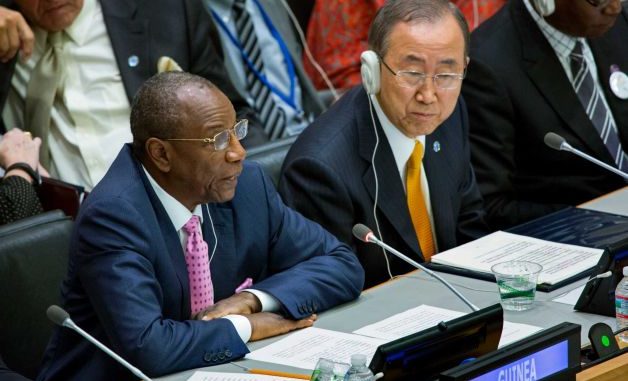
I thank H.E. Mr. Alpha Condé, President of the Republic of Guinea, for joining us in person. I also welcome H.E. Mrs. Ellen Johnson-Sirleaf, President of the Republic of Liberia and H.E. Mr. Ernest Bai Koroma, President of the Republic of Sierra Leone, who are participating by video teleconference link, and are now observing the proceedings. President Johnson-Sirleaf and President Koroma will shortly deliver their statements from the screens on either side of this podium. Thank you for your participation and leadership.
We come together today in solidarity with the people of Guinea, Liberia and Sierra Leone as they face the largest and most deadly Ebola outbreak the world has ever seen.
Ebola is raging. It kills more than 200 people a day, two thirds of them women. Despite the valiant efforts of local communities, health systems are buckling under the strain.
Many have tried to shut out the virus by closing their borders. Several airlines have stopped serving the three countries. The number of ships docking at their ports has dwindled.
But such an approach only makes the situation worse, isolating countries when they need help most.
There is some encouraging news to report.
In some treatment centres, patients are receiving the care they need. In several locations, community-based programmes are yielding promising results.
I want to pay special tribute to the health workers on the frontlines. More than 300 have died after being exposed to the virus.
At great personal risk, numerous national, regional and international organizations, civil society groups and NGOS such as the International Federation of the Red Cross and Red Crescent and Médecins Sans Frontières are making vital contributions, providing safe burials and providing patients with dignified care.
The Presidents of Guinea, Liberia and Sierra Leone have asked for our help. The United Nations has outlined the critical resources that are needed.
Dozens of countries and organizations, too many to mention by name, are making life-saving contributions, and I thank all of them for their generous support. But even these are falling significantly short of the twenty-fold surge that is required.
There is overwhelming international political momentum for the United Nations to play a leading role in coordinating the response. We will play this role and meet this challenge.
UN staff are eager to help. Within 24 hours of a call for staff to deploy, we received 4,000 applications. Some staff are preparing to depart over the weekend.
The entire UN System is mobilized, including the World Health Organization under the leadership of Dr. Margaret Chan, and the World Bank under the leadership of President Jim Yong Kim. The UN peacekeeping mission in Liberia, as well as all agencies, funds and programmes in the affected region, have been providing assistance for months.
The UN response will be spearheaded by the United Nations Mission for Ebola Emergency Response, or UNMEER, which will be led by my Special Representative Anthony Banbury.
UNMEER advance teams have deployed to the mission headquarters in Ghana and to the three most affected countries. One core responsibility will be to support prevention efforts throughout the region.
Dr. David Nabarro will continue to provide strategic guidance as my Special Envoy and as part of a Global Ebola Response Coalition.
Working with Governments, communities and the full spectrum of international partners, we are focusing on stopping the outbreak, treating the infected, providing essential services, preserving stability and preventing outbreaks in non-affected countries. These five priorities spell out the word STEPP. Today it is time for the international community to step up — and help Guinea, Liberia and Sierra Leone continue on the path of development and stability.
This crisis has highlighted the need to strengthen early identification systems and early action. We should consider whether the world needs a standby corps of medical professionals, backed by the expertise of WHO and the logistical capacity of the United Nations. Just as our troops in blue helmets help keep people safe, a corps in white coats could help keep people healthy.
Now is the time for a robust and united effort to stop the outbreak. The world can and must stop Ebola — now.
Thank you very much for your commitment.

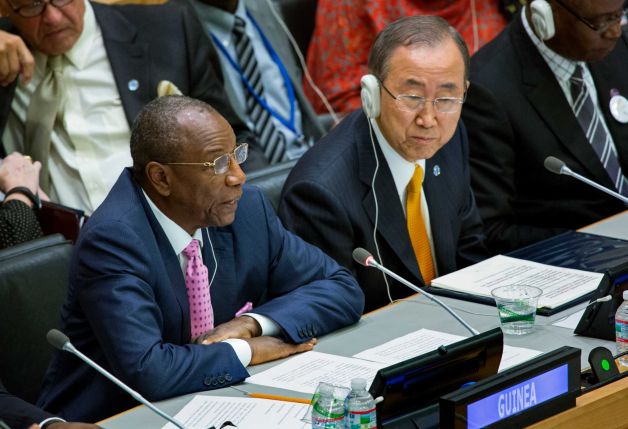
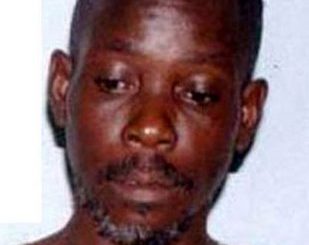
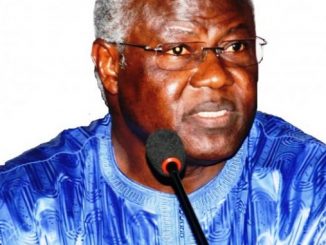
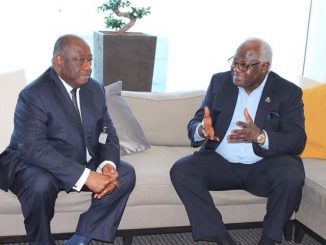
Leave a Reply